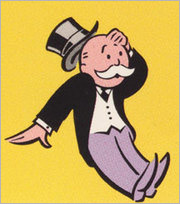
Here is another example of the perils of privatized medicine. I love the headline. As I have said before the business press tells it like it is.
A private monopoly threaens non-profit medicine in the U.S. But hey its a 'private' monopoly which the right wing loves they just hate 'public' monopolies. Here a private monopoly threatens the very existance of non-profits. Thats American competition for ya. The competition is not between capitalist corporations but between a private monopoly and public services. The monopoly will win of course. And that will leave the non profits relying on further taxpayer subsidies to make up for their loss.
Now if America had socialized medicine like Canada then the 'advantages' of cost reductions this private monopoly has would be a public advantage. Something the US state refuses to do right now under the Bush regime, which is use its economic clout to buy drugs at a discount.
Cancer Capitalists
Cancer treatment is one of the few bright spots on Dr. Dale Fell's income statement. His nonprofit Mission Hospital in Asheville, N.C. loses money on its emergency room, its pediatric division and its care for indigents. But not on radiation used to zap tumors at a cost of up to $50,000 per patient. Oncologists send 1,700 patients a year to Fell's hospital, one of two in western North Carolina with a radiation department.
Then last fall US Oncology, the giant cancer care services company, received approval from state regulators to buy a linear accelerator and launch its own radiation department three miles away from Mission. "This could cripple us," Fell says. He has sued state regulators, alleging us Oncology's radiation license violates state law.
Founded in 1999, US Oncology manages the business affairs of 1,000 cancer doctors, injecting practices with financial savvy and a competitiveness seldom seen in medicine. US Oncology's affiliated physicians treat 550,000 patients a year--one in seven new cancer sufferers. The company helps practices claim bigger chunks of the $80 billion cancer care market by recruiting new physicians, adding treatments and conducting clinical trials. It recently became the nation's single largest purchaser of chemotherapy drugs, spending a projected $2 billion this year. The clout allows US Oncology's doctors to demand drugs at a 24% discount on wholesale prices. US Oncology booked $239 million in operating income (defined as earnings before interest, taxes and depreciation) in 2005, on revenue of $2.5 billion.
The company has attracted a swarm of critics, often nonprofit or community hospitals, alleging that US Oncology destroys the fragile local economics of the U.S. health care system. The company has had to defend four whistleblower lawsuits alleging improper Medicare billing. (None went to trial.) Nonprofit hospitals in North Carolina have accused it of trying to push through anticompetitive legislation to help carve out a monopoly.
Find blog posts, photos, events and more off-site about:
cancer, USOncology, NorthCarolina, NC, US, privatized-medicine, medicare, healthcare, privatization,
No comments:
Post a Comment